Recently updated on December 3rd, 2025
In this article, we cover ten of the best course management system choices that we’ve heard about or that our customers have used. We also take an in-depth look at the standout features a course management system should contain to help you effectively manage the entire scope of your course management operations.
Why is this important? From our experience, organizations seeking a course management platform frequently have questions, particularly concerning:
- The registration features the platform contains to help them convert more potential registrants into paying customers.
- The platform’s communication features—particularly around course booking and rescheduling.
- Whether the course management system includes reporting features that can help them assess if they are generating ROI from the platform and how much revenue their courses are bringing in.
Common challenges training providers are trying to solve with a course management system
First, let’s look at the common challenges that trainers are trying to solve with a course management system.
1. Too much manual admin
Providers often manage registrations, schedules, instructor availability, venues, and customer communication manually. This becomes overwhelming as the number of courses or clients grows. A course management system automates repetitive tasks and centralises information.
2. No easy way to take bookings or payments online
Many organisations can’t offer a smooth, self-service booking experience. They struggle with:
- no online checkout
- manual invoicing
- limited payment options
- no promo codes or group booking logic
A course management system solves this with integrated e-commerce such as Stripe and Xero and automated confirmations, receipts, and reminders.
3. Difficulty managing multiple delivery formats (ILT, VILT, elearning, blended)
A standalone LMS handles self-paced learning, but not scheduling, resources, or blended learning delivery. Providers need a system that supports all delivery models without using separate tools or duplicating data.
4. Poor visibility of business performance
Many can’t track course profitability, forecast demand, see which courses are underperforming, or report on utilisation of instructors and training rooms. They need dashboards and reporting that help them make data-driven decisions.
5. Disjointed systems that don’t talk to each other
Training teams often use one system for registrations, one for eLearning, one for CRM, one for accounting, and spreadsheets for everything else. A course management system brings these together — or integrates cleanly with existing systems — so data isn’t duplicated or lost.
6. Inconsistent customer communication
Manual reminder emails, certificates, joining instructions, and follow-ups create risk and inconsistency. Providers want automated communication flows triggered by enrolments, completions, attendance, and cancellations. Learners expect timely, relevant communications, plus a professional booking process, clear instructions, personalised schedules, and easy access to course materials. Providers need a system that elevates the experience without adding admin.
7. Compliance, tracking, and certification headaches
Many industries require proof of attendance, recertification reminders, compliance reports, or secure record-keeping. Providers look for a system that manages certificates, attendance, renewals, and audit trails.
8. Inefficiency slowing growth
When teams are buried in admin or duct-taping together different tools, they can’t scale. A course management system frees up staff time and provides the infrastructure to expand into new regions, formats, or markets.
Best Course Management Systems
- Arlo Course Management Software – The Overall Best Course Management System
- iSpring Learn
- Eloomi
- Cloud Assess
- Adobe Learning Manager
- Litmos
- Blackboard Learn
- Absorb LMS
- Docebo
- SC Training
Buying factors to consider when evaluating course management software
Factor #1 – Does it contain features that make it easy to upload, schedule and manage your courses
Course Management
Course management software should automate or, at least, significantly streamline many of the processes you currently use to plan, schedule, and manage your courses. This includes the time you spend:
- Creating, uploading, and scheduling your courses on your portal, such as your training website.
- Configuring and setting up your course registration forms and promoting your courses to your audience.
- Managing all of your logistical activities, such as booking venues, selecting the right format for a training session (e.g., in-person or live online), booking and managing instructors, and much more.
- It should also provide you with in-depth analytics and reporting tools so you can report on key metrics such as course attendance rates, profitability, ROI, and more.
Registration Management
Aside from scheduling and delivering the sessions, making sure your course registration process is effective as possible is arguably the most crucial factor in whether your course is as successful as you want it to be. A course management system that you choose should have flexible registration forms that are suitable for both public and private courses.
For example, with Arlo registration forms can be set up for a range of course types, including paid and free courses, through different registration methods. For paid courses, use the default order process registration method, which includes a full order and invoicing process. For free courses, you can use a simple one-page form. Alternatively, set up a custom URL to promote specific courses on your website
Course registration forms should also give your customers the option to add multiple registrants, register for multiple courses, and pay all through the same form.
In-depth course and business reporting features
Any effective course management system should allow you to create a variety of reports so you can monitor the effectiveness of individual courses and your entire training business. These include:
- Reports that show how much revenue your training business has generated over a specific period of time, and revenue by individual course.
- Reports that show you registration data and trends, such as course attendance or registration trends over time.
- The ability to automatically generate specific reports depending on the course and send these key reports to relevant stakeholders.
Ideally, you should also be able to view all of this data within smart dashboards that make it easy for you to drill into the data you need so you can uncover and track more granular activity and data that’s relevant to your business.
Factor #2 – Is it user-friendly and what do its customer reviews look like?
Any large platform that can have a transformative effect on your business, like a course management system, needs to be user-friendly and have sufficient support resources available to make onboarding, ongoing platform training, and support as easy as possible. You can review their Help Center articles to gain an understanding of what a vendor’s support will look like.
To support any claims a provider makes, they should have a collection of customer reviews that you can explore to gain a deeper understanding for yourself.
For example, with Arlo you can view our customers page to read more than twenty detailed case studies of the impact our training management system has provided different training organizations. You can also read over 80 reviews on our G2 page.
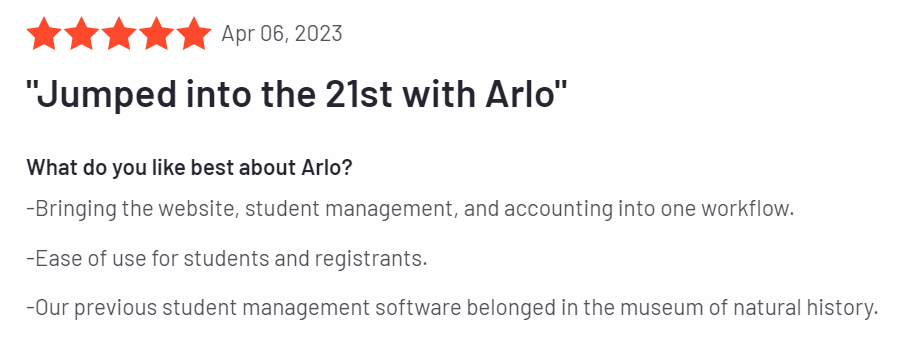
Factor #3 – Is pricing transparent?
You shouldn’t have to feel like you’re going in circles or jumping through a million hoops to find out how much a course management system you’re considering investing in should cost. You should be able to see what the software costs, and the features included in each pricing tier, on a vendor’s pricing page.
At Arlo, we make it as easy as possible to give you an understanding of what our course and training management system will cost before you get in touch.
For example, on our pricing page, you can see a clear overview of what’s included in our ‘Professional’ and ‘Enterprise’ options, and a breakdown of how much each costs based on the number of administrator licenses you need, and the number of paid and free course registrations your training organization processes per year.
You can view our pricing page here.
Factor #4 Are you experiencing any of these issues with your current course management processes?
If you’re managing course or training operations but are unsure whether you need a course management system, take some time to consider if any of these problems, issues, or questions are affecting your business:
- Are you manually handling tasks like course uploads, course scheduling, course bookings, email communication, invoice creation, website updates, or training operation reports?
- Is your data siloed across various sources?
- Are spreadsheets your go-to for tracking registrations, attendance, or tasks?
- When you adjust an course schedule, does your website update automatically?
- Are manual calculations or processes causing preventable human errors?
- Do your systems integrate seamlessly, or do you need to manually ensure consistency across them?
- Do you think your customers have a smooth experience when they sign up for your courses? And are your course fill rates where you need them to be?
If you answered yes to any of the above, then a course management system could be what you’re looking for.
You can get a more in-depth look at the exact features a course management system contains in our ultimate guide.
Factor #5 Does the course management platform integrate with your existing tech stack?
Whatever your current course management process looks like, there’s more than likely some software involved somewhere, such as a learning management system (LMS), marketing automation tools, and more.
To make implementation as easy as possible and to keep your tech stack streamlined, your course management system should integrate with your existing platforms, primarily your CRM and LMS.
Arlo, for example, integrates with a wide array of leading platforms including:
- Accounting platforms like Xero, Sage, FreshBooks, and QuickBooks.
- CRMs like Salesforce and HubSpot.
- Marketing automation and analytics platforms and customer survey tools such as Google Tag Manager and Analytics, Marketo, Survey Monkey, and Mailchimp.
- Leading learning management systems like Moodle, TalentLMS, LearnDash, and more.
10 Best Course Management Systems Ranked
1. Arlo Course Management Software – The Overall Best Course Management System
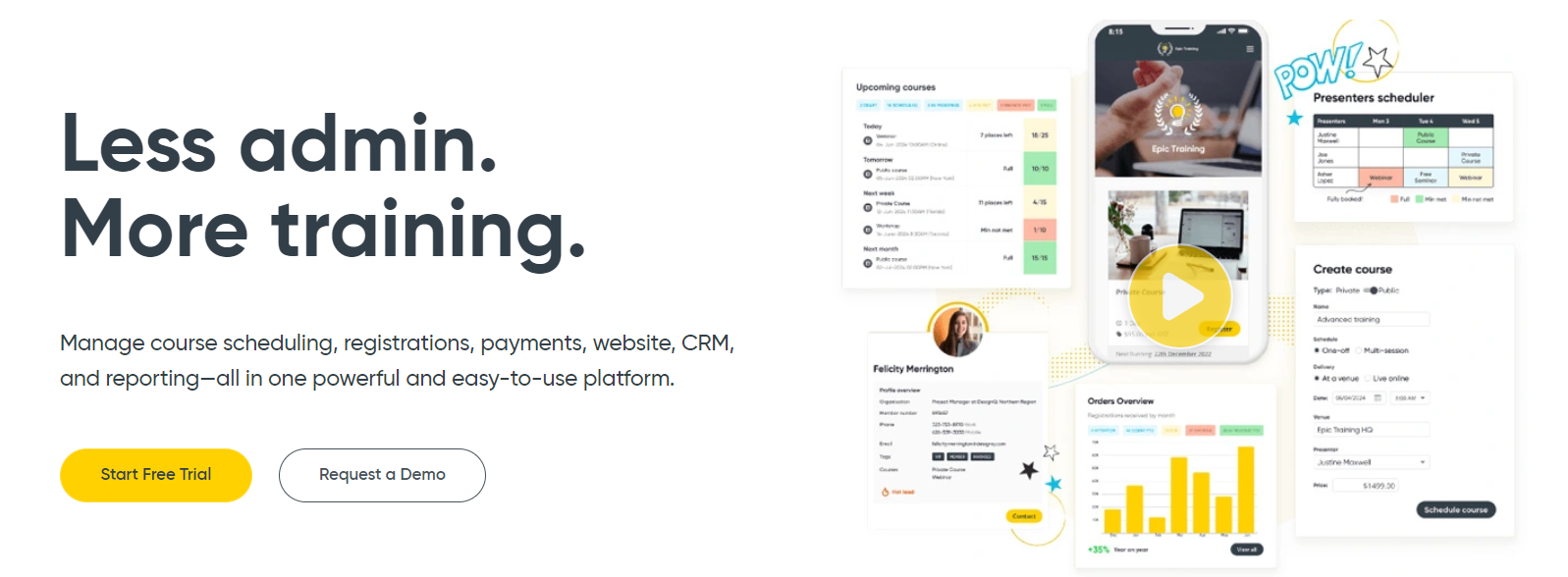
Arlo is the #1 training and course management system available today. It is used by hundreds of training companies in over 70 countries to plan, schedule, and manage all of their courses and training programs within one central platform.
The key features:
Course management and scheduling
Arlo simplifies course management, enabling you to create and sync new courses to your website quickly using an intuitive dashboard. Our course creation features are designed to accommodate various formats, including face-to-face, live online courses, blended learning, and eLearning.
Each course can be tailored to a specific delivery method of your choice. For courses with multiple sessions, you can set different delivery methods for each session. For example, one session might be live online, while the next could be classroom-based.
To save you time and prevent you from having to enter the same course information repeatedly, you can use pre-built course templates or build a new template that you can use now and in the future.
The platform’s setup wizard guides you through the process of creating a course, making it easy to find and assign trainers and venues. You can also add custom fields to capture specific information and include optional extras such as course materials or additional sessions.
Our platform also helps you improve task management by providing a comprehensive view of upcoming courses, instructors, and venues. Tasks can be assigned to administrators, with automatic notifications sent to the assignee containing all relevant details.
Arlo also provides full calendar views of courses, instructor availability, and venues, allowing you to quickly access essential information like contacts, catering, and room setup details. All of this makes it easy to manage all the logistical aspects of your course setup.
Registration management
Arlo helps make your course registration as easy as possible for your customers, handling everything from taking online registrations to transferring, recording attendance and grades, and generating reports.
Arlo’s registration forms are designed specifically for courses. Registration forms can be set up for a range of training types, including paid and free courses, through different registration methods. For paid courses, use the default order process registration method, which includes a full order and invoicing process.
For free courses you can use a simple one-page form. Alternatively, set up a custom URL to promote specific courses on your website.
Course registrants can add multiple participants to a single booking form, register for multiple courses, and enter billing details (or another payment contact) all within the same form. Once the order is placed, the registrant receives an automatic confirmation email. After the order is confirmed, registrants receive an email with detailed course instructions.
Payment options are flexible, allowing you to accept payments via Stripe, PayPal, Windcave, credit card, invoice, and bank transfer. To simplify accounting, you can connect Arlo with QuickBooks or Xero.
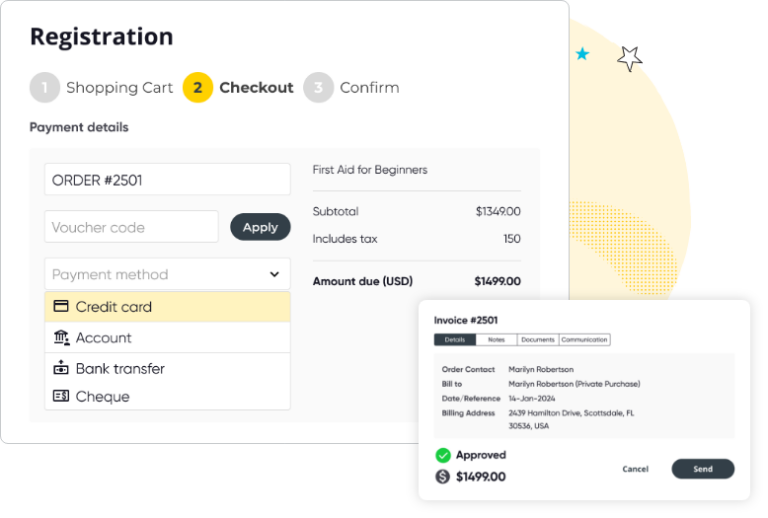
Automated course communications
Tired of spending hours copying information into emails, checking if you’ve sent that payment reminder, or updating customers about changes? A good CMS takes care of your emails for you. Arlo automates emails for course registrations, payments, reminders, feedback surveys, personalized certificates upon course completion, and more.
Your emails will also be on-brand, with custom styling options like colors, fonts, and logos.
Other communication features include:
- Smart notifications that can be set up based on waitlists, minimum registrations met, and more.
- Trigger emails to instructors that request and confirm availability.
Detailed reporting insights
Arlo gives you access to a wide range of reports for your business customers and stakeholders, helping you measure performance, profitability, and engagement. Some of the main types of reports you can create in Arlo are:
Registration reports
Registration reports are designed to give you insights into how registrants are behaving and performing. You can generate reports to track and analyze registration data, such as course attendance by organization or registration trends over time.
For example, you might need to report on how many people from a specific organization have registered for courses since a certain date. Using advanced registration reports, you can include additional information like departments, providing a comprehensive view of your data.
Order reports
Order reports help you understand your financial performance. Create reports to find out how much revenue your training business has generated over a specific period, or identify outstanding balances and billing contacts for follow-up.
Advanced order reports allow you to include detailed billing and contact information, helping you manage your accounts efficiently.
Performance reports
Performance reports provide insights into the revenue generated by individual courses. These reports help you identify which courses are most profitable and where to focus your efforts. For instance, you can compare the revenue from different courses, analyze refund amounts, and make data-driven decisions to enhance your course offerings.
Combining reports for business intelligence
Combining data from multiple reports allows you to gain comprehensive insights into course and training performance. For example, you can merge performance and expense reports to determine course profitability, or analyze occupancy rates to optimize course scheduling and marketing efforts.
Real-time dashboards that drive action
All of the metrics that you choose to report on can be viewed in real-time dashboards, helping you see exactly how your courses are performing in real time.
CRM and sales tools built for course management
Arlo contains a powerful CRM (Customer Relationship Management) system that allows you to effectively manage your contacts and organizations.
Arlo stores a record of history against individual contact and organization records, so you can easily see all of their course activity, including completed courses, courses they are on a waiting list for, order history, organization information, and more.
Other key CRM features include:
Contact and organization management
Manage contacts and organizations with detailed records, including course activity and order history. Automatically create or update contact and organization records through website registrations, interest forms, and customer portal account creation.
Custom settings management
Control settings for contacts and organizations, including address behavior and custom fields.
Self-service options
Allow customers to update their details through the customer portal, enhancing the user experience.
Referral source tracking
Capture and report on customer referral sources to identify your most effective sales channels.
Arlo’s Course Management System
Explore Arlo
Experience how Arlo can help you manage your training business. Book a free demo with our expert team.
2. iSpring Learn
iSpring Learn is a web-based learning management solution designed to help companies onboard new hires through personalized learning experiences. It offers course management tools for creating interactive courses, tracking learner progress, and automating onboarding tasks. The platform supports various course and content formats (specializing in eLearning), including videos, quizzes, and simulations, allowing for engaging and effective training materials.
Pros
- Great for various types of training such as compliance, on-the-job, and product training
- Extensive reporting functions and streamlined course management
Cons
- Limited customization features


3. eloomi
eLoomi is an all-in-one learning and development platform designed for comprehensive training management, focusing on employee development. Its features include course creation, learner tracking, and performance management. eLoomi supports various content formats, including videos, social learning elements, and interactive modules, to create engaging training experiences. It also offers detailed analytics and reporting to monitor learner progress and evaluate the effectiveness of training programs.
Pros
- Comprehensive all-in-one platform
Cons
- Cost can be high
- Lots of features that may not be required for all users

4. Cloud Assess
Cloud Assess is a learning management platform aimed at addressing skill and knowledge gaps for frontline and deskless workers. Their course management features include an extensive free course library, containing thousands of courses that can help you upskill your workforce. The courses offer accredited content and practical assessments across a wide variety of industries and job roles. Learners can also access resource libraries full of PDFs, presentations, and spreadsheets to assist them through their courses.
Pros
- User friendly course page layout
- Extensive course library
Cons
- Clunky search and filtering features
- Pricing lacks transparency.
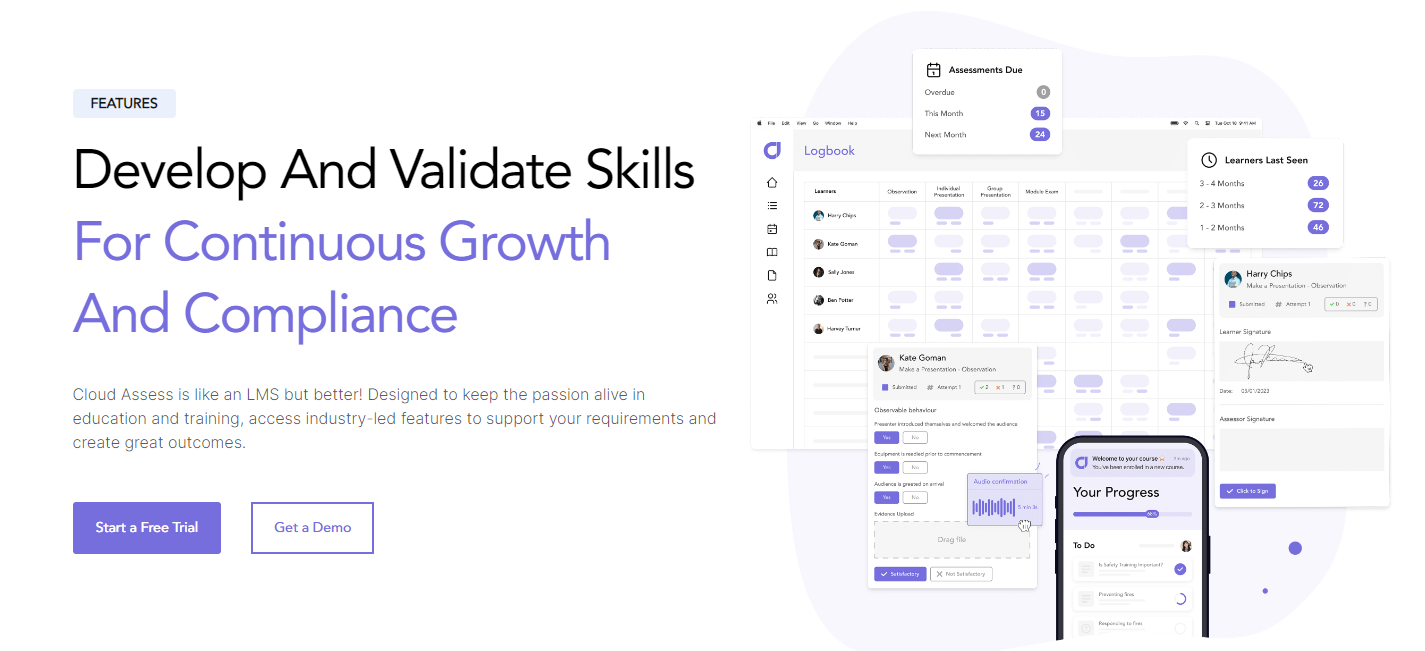

5. Adobe Learning Manager
Adobe Learning Manager is an intuitive platform with interesting course management features. These include “headless” LMS capability, which makes it possible to access course content within any app or website via a suite of APIs. Adobe is also rolling out AI features that can give learners personalized learning paths and course recommendations, and AI features that continually update courses when new information is available.
Pros
- Extensive features, and a very robust platform, making it great for those looking for an enterprise course management solution
- Innovative AI features
Cons
- Many not be suitable for smaller organizations

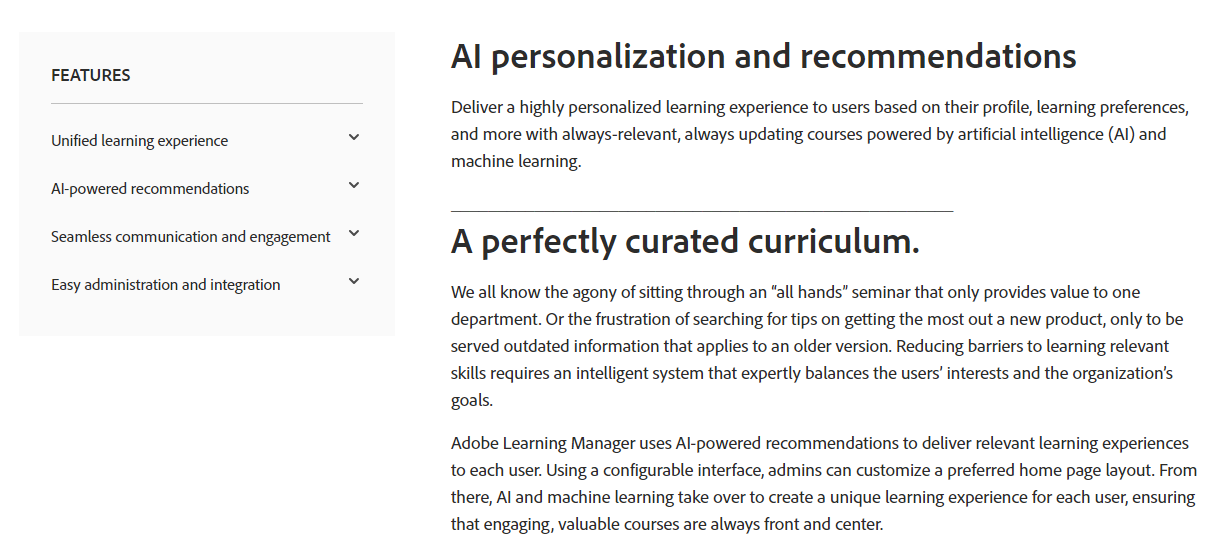
6. Litmos
Litmos is an LMS designed to help internal training teams at companies across a broad spectrum of training needs, such as professional development and compliance training. Within the platform, you’ll find course authoring tools to create your own courses. You’ll also get access to over 2,000 off-the-shelf courses built into the LMS, with further options to expand access to a wider library of courses. Other notable course management features include individualized course reporting options and analytics insights.
Pros
- Easy to use course creation features
- Great customer support
Cons
- Lots of features that make take a while to get used to.
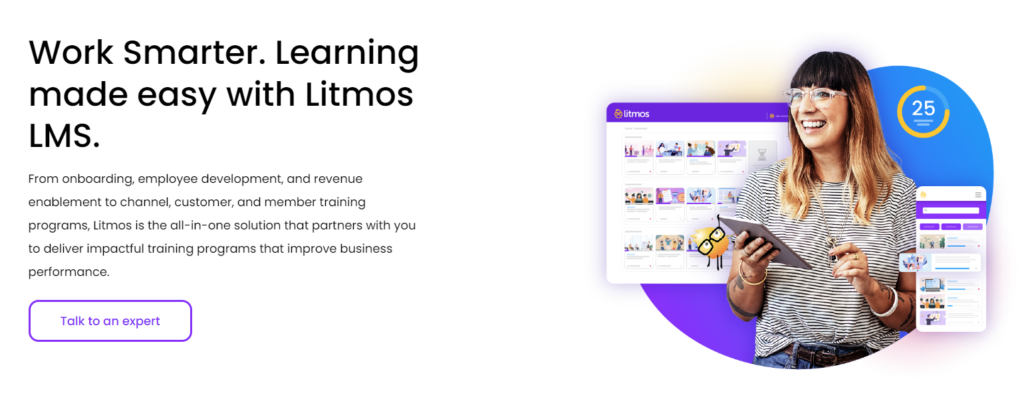
7. Blackboard Learn
Blackboard Learn is a learning management system specifically tailored for higher education. Its course management features include creating and editing courses, setting default properties for new courses, enrolling and removing users from courses, and backing up, archiving, and restoring courses. Users can also generate several reports to help monitor user activity associated with the courses being run.
Pros
- Great option for higher education institutions
- Crisp layout and fresh looking platform
Cons
- Broad features set may not be required for all customers
- Designed for higher education, so not suitable for all.

8. Absorb LMS
Absorb LMS is a cloud-based platform that contains multiple course management features such as course creation functions, a course library, and course reporting. Depending on the package you choose, the platform gives you access to between 500 to 20,000+ courses. These courses are centered around compliance training, safety programs, skills, and continuing education. Its reporting features enable you to track individual learner progress, such as whether they’ve completed a course or how long they have left to go. Users note the platform’s user-friendly interface and customer support as standout features.
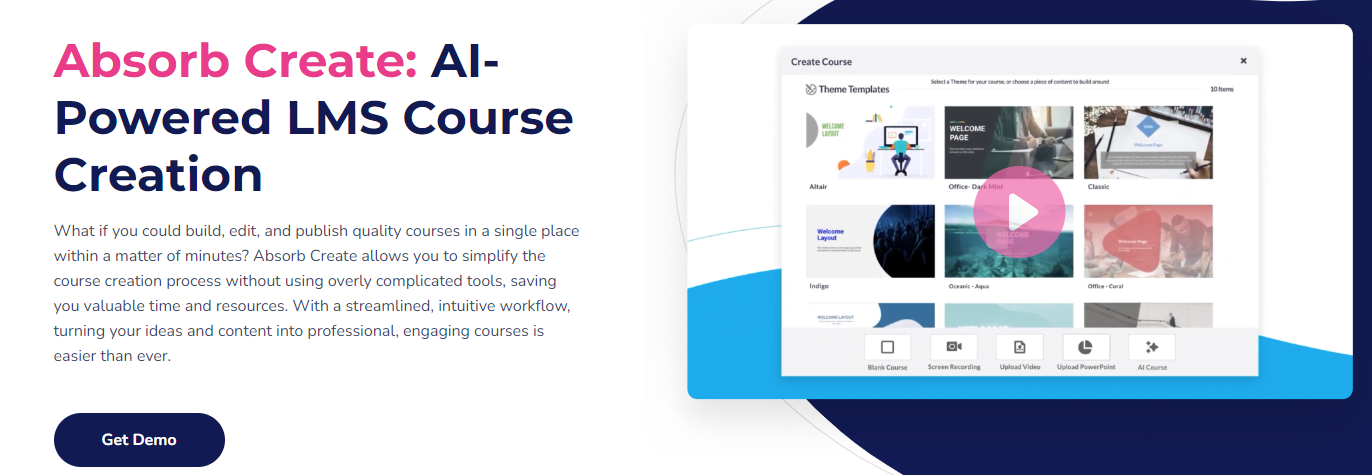
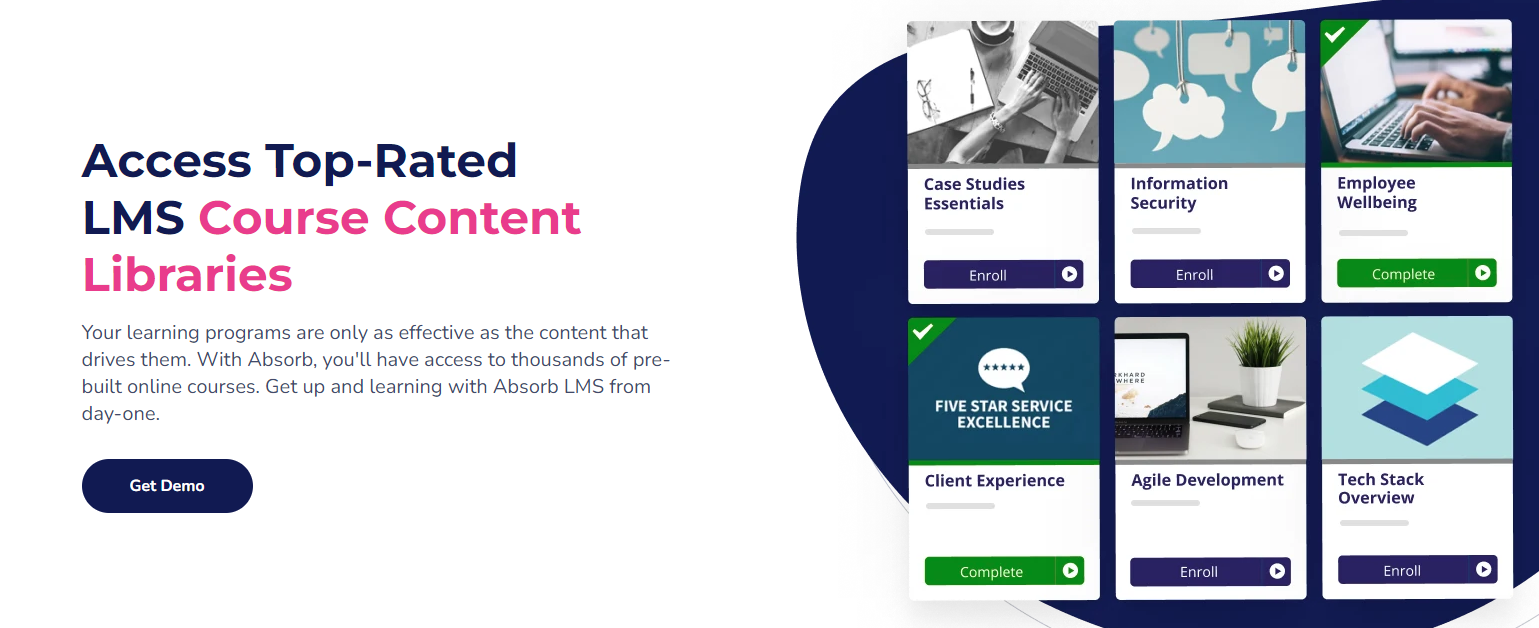
Pros
- Great customer support
- Vast course library
Cons
- Reporting features
- Can be expensive to implement depending on budget
9. Docebo
Docebo is a learning management system designed for employee, partner, and customer training. Its course management features are centered around a dedicated course management dashboard. Through this dashboard, users can create, organize, and customize courses. Courses are displayed in a customizable table format, and categories facilitate efficient filtering and management, including sub-categories and real-time filters for quick navigation. Additionally, the platform includes a course library and features for course creation.
Pros
- Good customer support
- Extensive feature suite
Cons
- Limited customization
- Inadequate reporting features.
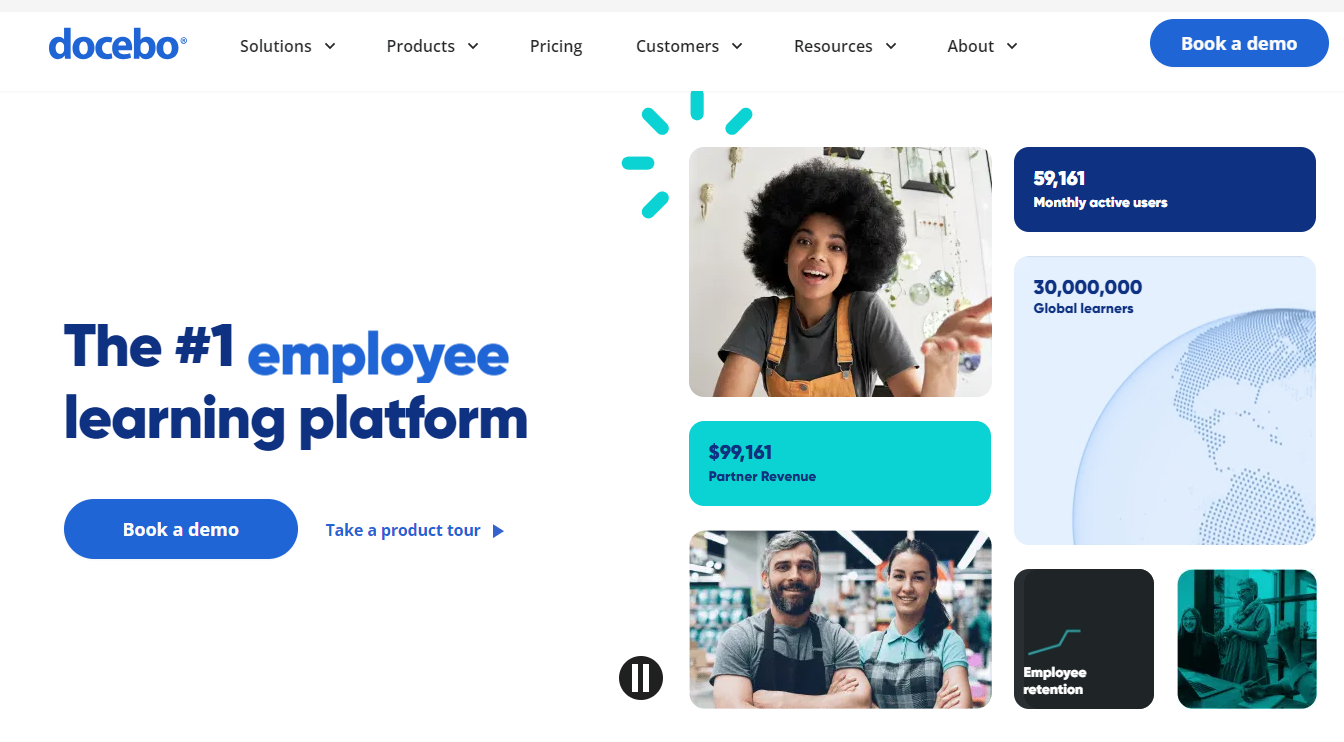
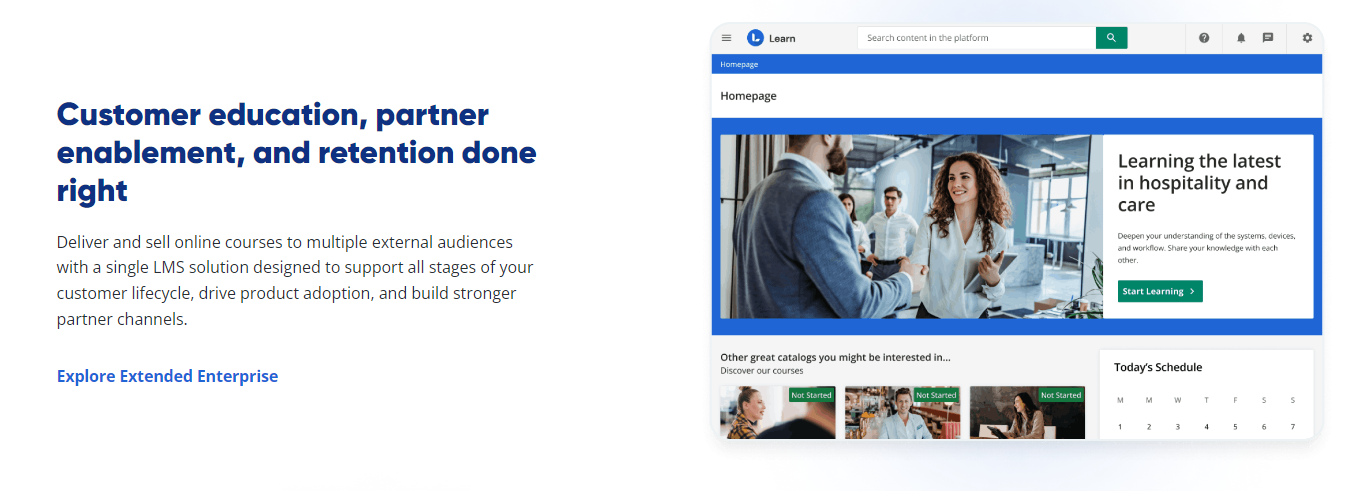
10. SC Training
SC Training (formerly EdApp) is an LMS, a mobile-first learning platform that includes a comprehensive, editable course library with over 1,000 ready-made courses for customers to offer their learners. Within the platform, you can create new eLearning courses in minutes. The platform also features AI course creation capabilities, which you can use to generate new ideas, create entire courses, or brainstorm concepts. Users highlight ease of use and course creation functionality as standout features of the platform.
Pros
- Extensive library of existing courses
- Platform is interactive and built for ease of use
Cons
- Lack of customization
- Lack of guidance and adequate customer support
- Limited course templates
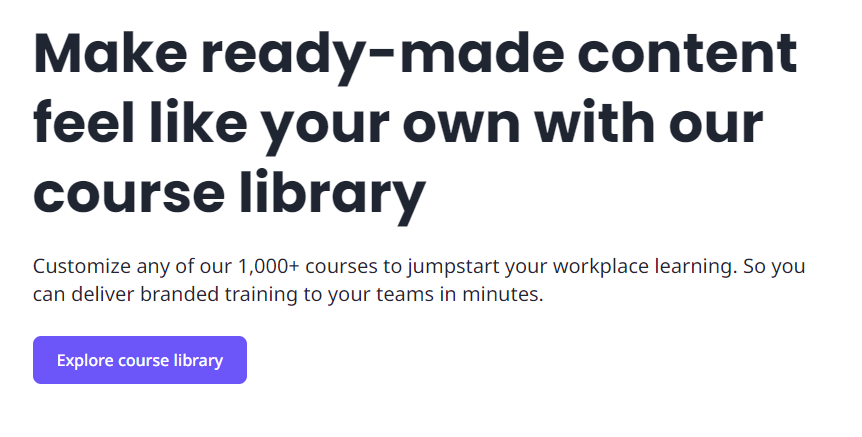

Want to discover how Arlo can help you say goodbye to manual processes and messy spreadsheets?
At Arlo we work with hundreds of training businesses that have ditched their outdated manual course and training management processes, and embraced a platform that manages helps that automates manual processes, gives them their time back, and increases their training revenue.
Explore Arlo
Experience how Arlo can help you manage your training business. Book a free demo with our expert team.
FAQs
A Course Management System (CMS) is a specialized enterprise software designed to automate and optimize the management of Instructor-Led Training (ILT) and virtual Instructor-Led Training (vILT). For example, a CMS automates administrative tasks such as scheduling, registrations, invoicing and emailing. It’s designed to be the central hub for all processes, information and communication, so everything is stored in a single system.
Course management systems positively impact ROI in various ways:
– With streamlined and automated course scheduling you can get course live much quicker than when using manual processes. Platforms like Arlo integrate with your website and allow you to bulk upload up to 200 courses at a time. So at the click of a button you can get hundreds of courses live on your website, start marketing them to your audience and generating sign ups.
– Registration forms that have options such as adding multiples courses to a single sign-up form, and signing up multiple participants through a single form mean you can generate more revenue more quickly.
– CMSs like Arlo allow you to run courses in multiple formats such as face-to-face, live-online, blended and eLearning, so you can scale your training much more easily. Course templates make it easy to quickly schedule repeat courses that re-run on multiple dates and locations.
– More generally, a course management system automates manual processes across the entire scope your learning operations which equates to hours saved per week. Giving you much more time to spend on activities that positively impact your bottom line.
Course management systems are also known as training management systems (or software). These platforms are specifically designed to help you manage everything to do with commercial training, and sell online courses and in-person courses.
Course management systems are also sometimes confused with learning management systems – but they are different. Leaning management systems are more centered around the creation, delivery and management of online learning content. The best course management systems like Arlo integrate with the best learning management systems like Moodle LMS.
Yes, many of the top learning management systems can help manage courses – many of the options we’ve looked at in this guide are classed as learning management systems.
Arlo integrates with an impressive amount of different platforms such as:
Accounting system – keep on top of transactions and breeze through your bookkeeping duties with an accounting system that ties in with your training management solution. Arlo integrates with Quickbooks, Xero and more.
Advanced CRM – synchronize and track your customer interactions so you never miss a lead. Most training management systems come with a CRM built-in. However, if you’re a large business, you may need a focused CRM with advanced capabilities. To help with this Arlo integrates with CRMs such as Salesforce and HubSpot.
Learning Management System (LMS) – expand your courses to blended learning by including self-paced eLearning content that can be accessed anytime, anywhere. Arlo integrates with Moodle, Learndash and more.
Webinar delivery – increase your reach with remote learning delivered live online. Arlo integrates with Zoom, GoTo Webinar and more.
Marketing tools – build newsletters and campaigns that deliver registrations to your doorstep. Arlo integrates with a whole most of marketing tools including Google tag manager, Google analytics, Meta, Marketo, HubSpot and more.
Online survey tools – get answers fast and use this customer feedback to improve future user experience. Arlo integrates with Survey Monkey, Mailchimp and more.
